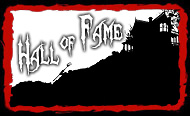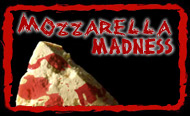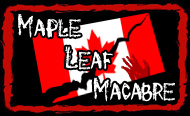
An American Werewolf in London (1981)
Studio: Arrow Video
Release date: March 15th, 2022
Reviewed by: Brett Gallman (@brettgallman)
The movie:
After watching An American Werewolf in London for the umpteenth time with the intention of writing this review, it occurred to me that I’ve never quite been able to articulate just why it’s always been one of my favorite movies. It’s been a staple in my life for just about as long as I can remember (I’ve even had the good fortune to see it projected in 35mm, something I can’t say about many movies produced before I was born), so much so that its greatness has always just sort of been a matter of fact. I mean, what’s not to love about a movie that has pretty much everything? Wit, terror, affable characters, incredible gore and creature effects, impeccable craftsmanship—it’s all done here with gusto by a filmmaker who seems to effortlessly pull off the tricky proposition of mixing horror and comedy. It’s that apparent effortlessness that makes An American Werewolf in London feel like cinematic magic, or, perhaps more appropriately, a beguiling transformation: this is a movie that often feels like it shouldn’t work, yet it’s a multi-genre hallmark, one that’s as funny as it is horrifying as it engages with familiar werewolf lore.
Writer/director John Landis plunges headlong into the horror canon here by dropping his two protagonists right in the middle of a Hammer movie. After disembarking from the back of a sheep truck, American backpackers David Kessler (David Naughton) and Jack Goodman (Griffin Dunne) find themselves wandering near the Yorkshire moors, and the only refuge in sight is The Slaughtered Lamb, a local pub full of leering, cagey locals. A pentagram adorns the wall, sparking a curiosity in the duo that’s met with cryptic warnings to beware the moon. It’s the exact sort of thing you would have seen from Hammer a decade earlier, when its films would routinely feature characters stumbling upon some horrific local lore. Landis leans right into all of this when the skittish Americans decide to scurry out into the black of night, wolves baying in the distance as the two chat about anything they can to keep their minds off of the foreboding surroundings because they've crucially taken heed of the warnings. A lesser filmmaker may have had the duo scoff, putting them into a position where their obvious fate might feel like deserved comeuppance. Instead, when the local legend catches up to them in the form of a werewolf that mauls Jack to death and maims David, it's genuinely disturbing.
While this opening sequence of An American Werewolf in London shows a streak of cheeky self-awareness, it’s one of the few stretches of the film that feels conventional. Landis embraces classic horror conventions: the uneasy ambiance of the pub and the moonlit moors, the foreboding, creeping terror of the wolf stalking its prey, the gory payoff that ends with multiple bodies slathered in gore. However, once David revives in a London hospital, Landis turns the whole thing inside-out, essentially transforming this familiar horror tale into a tragicomedy through a series of singular—and often odd—moves. David’s ordeal, which finds him falling in love with his nurse, Alex (Jenny Agutter), might follow the standard werewolf arc, but Landis embellishes it with gonzo, idiosyncratic flourishes, like nightmares of beastly Nazi soldiers mowing down David’s Jewish family with machine guns. Only moments later, a pair of cops blunder through the investigation in a sequence that doesn’t dull the horror so much as it weirdly accentuates it. Landis’s blending of horror and comedy is odd in this very specific way—it’s not so much that the laughs derive from how over-the-top the horror is (the conventional approach with this kind of genre-mashing) but from how unexpectedly they’re deployed. It’s more of an uneasy humor, almost as if Landis is goading you to laugh when you shouldn’t.
This approach is most embodied in the presence of Jack, who returns throughout the film as a steadily decaying corpse intoning David to kill himself. It’s what he’s going to have to do, after all: we know how these things end, and Landis makes a gas out of the tragedy of a man losing his humanity to a horrific curse. And, again, he does so in odd fashion by staging David’s werewolf affliction in straight fashion: save for the cheeky placement of CCR’s “Bad Moon Rising,” David’s transformation is agonizing to watch as he frets about the house, trying to go about a normal routine with the knowledge that he may turn into a bloodthirsty creature at any minute. And, wouldn’t you know it, that’s exactly how Landis imagines it: the transformation hits David like a bullet, touching off that legendary effects sequence that immortalized Rick Baker’s place in the horror pantheon and revolutionized filmmaking. 40 years has done nothing to dilute its effectiveness thanks to Landis’s lens lingering on every excruciating detail, something the director later reportedly regretted for whatever reason. Thankfully, he went with his gut instinct at the time to allow the audience to bask in the grotesque magnificence of it all before unleashing David on some unsuspecting prey.
These scenes are also the stuff of conventional horror, with prowling camera work mounting the suspense as David lurks about various corners of London. Less conventional, though, are the follow-ups: there’s the great bit where he awakes, fully nude in a zoo before taking a child’s balloons to conceal himself when he slinks off. There’s the scene where he patronizes an adult theater, only for Jack’s spirit to appear once again, this time with the spirits of other victims in tow, each of them with their own suggestion for how he should kill himself—all set to the soundtrack of the porno playing in the background. Scenes like this are what define American Werewolf’s offbeat sensibility: it’s not so much that the laughs blend in with the morbid and the macabre so much as they trail in their wake, creating a unique sense of humor that’s never quite been harnessed ever again (not even by its own sequel, not by a long shot). Even its self-awareness of its own genre and lore isn’t mine for laughs, subversion, or mockery, which has become a staple of meta-horror; instead, David’s recitation of the lore he learned from movies only reinforces his fate. Knowing how it all works does nothing to save him, cementing American Werewolf’s place among its predecessors instead of allowing it to smugly perch above them.
As such, Landis doesn’t lose his grip and slip into irony. At no point does An American Werewolf in London feel like a farce or a parody. At its core, it still maintains a grip on the tragic dimension of this story, thanks in no small part to Naughton and Agutter, whose brief, doomed romance provides the film’s most crucial stakes. Cut through the monstrous effects, nightmarish visions, and dark humor, and you have a story of a pair of star-crossed lovers whose romance blossoms under the damnation of a full moon that leaves one of them dead on the streets of London, his naked corpse sprawling before a throng of puzzled masses. Among them is Alex herself, who witnesses the final glimmer of David’s humanity before he’s put down because, as another stalwart British studio once insisted, the beast must die. The fatalistic conclusion to American Werewolf is never in doubt, which perhaps speaks to why the humor works—it’s utterly human, after all, to laugh to keep from crying.
Maybe this is why Landis reserves the most incongruent, upbeat rendition of “Blue Moon” for that slam into the end credits, an ironic twist of the knife as The Marcels croon about finding an impossible love. This last chuckle comes with a tip to the hat to Landis, who pulls off the film’s final, most impressive transformation by warping a moment of devastating grief into a last, uncomfortable laugh. It’s in that moment of discomfort that you catch yourself that you realize Landis got you: here you are, making light of a tragic death, so maybe you, too, are a beast within. Don’t mistake this as an accusation though: if you strain hard enough, I think you could hear Landis himself howling along in the distance, pleased as punch at having pulled one last one over on the audience.
The disc:
Long revered as one of the horror genre’s finest films, An American Werewolf in London has been an obvious mainstay on home video throughout the years, having been issued and reissued on various formats. In 2019, Arrow Films delivered a definitive Blu-ray special edition boasting a newly remastered presentation and an abundance of special features that could only be topped if the studio reissued it in 4K. And that’s exactly what Arrow has done here with its latest limited edition release: everything that was present on their previous disc is retained, and the presentation is bolstered by the 4K format. As is the case with any properly done 4K presentation, American Werewolf looks wonderfully filmic: unfolding beneath a fine layer of grain, the colors and black levels are solidly reproduced, accompanied by the slighted uptick in detail thanks to the higher resolution. I can’t pretend to say it exactly matches that 35mm presentation I saw over a decade ago, but I imagine it’s closer than any previous release has ever been. For the sake of completion, Arrow also presents the original theatrical mono track and the film’s 5.1 remix, both of them in DTS-HD MA.
As for the extras, well…let’s just say you're probably going to want to set aside an entire day to dig through this one. This is one of Arrow’s most thorough and packed releases ever, and it would be impressive if it only featured the supplements they produced. Among them are a new commentary with Paul Davis, director of Beware the Moon, the 2009 feature length retrospective documentary that’s also featured here, and Mark of the Beast: The Legacy of the Universal Werewolf, a 77-minute documentary about the studio’s rich lycanthrope history. In my humble opinion, this is the the crown jewel of Arrow’s supplements: not only does it detail Universal’s various werewolf productions, but it digs even deeper, charting the creature’s pre-cinematic history in folklore and novels (most notably Guy Endore’s The Werewolf of Paris) before delving into the dawn of the studio, when Carl Laemmle produced horror material pre-dating some of the silent era’s more iconic fare. This, of course, set the mold for Universal, whose history with horror is carefully detailed. In some ways, Mark of the Beast feels like a misnomer because the documentary delves extensively into the various Frankenstein and Dracula productions to provide context for the emergence of The Wolf Man.
Featuring luminaries like Joe Dante and Mick Garris, it’s an especially compelling examination of Universal’s 40s run that culminates with Abbott and Costello Meet Frankenstein. It doesn’t stop there, though, as the various participants detail how TV birthed an entire generation of Monster Kids who came to appreciate these films after they fell out of fashion with the general public during the 50s and 60s. Truly, you haven’t lived until you’ve seen Joe Dante geek out about Shock Theater, something I hold near and dear to my heart because my own father has regaled me with tales of this programming my entire life. I’m probably not writing this review without Shock Theater, so this segment truly resonated with me. From there, the documentary breezes through the scant werewolf films leading up to Hammer’s revival of the Universal Monsters before taking a lengthy detour to cover An American Werewolf in London. There’s quite a bit of crossover from other supplemental material here, but it’s a nice tribute to Baker’s tremendous effects work all the same. It ends with a brief acknowledgement of Joe Johnston’s 2010 The Wolfman, which the participants rightly praise as a respectable update. But even if they didn’t go this far, it’d be a worthwhile doc for the vintage Universal stuff alone since a lot of the titles covered there don’t even have substantial supplemental material on their own Blu-ray releases (it's also nice to know that I'm not alone in having been disappointed by many some of the Universal "Monster Rally" films).
Arrow also commissioned new interviews and critical material that they’ve ported over. Landis himself appears in “An American Filmmaker in London," while effects artist Dan Martin provides his unique insight in “Wares of the Wolf.” Jon Spira’s video essay “I Think He’s a Jew: The Werewolf’s Secret” explores the film’s Jewish subtext, drawing a line straight from mythology to Nazi Germany to modern Jewish diaspora. Finally, filmmaker Corin Hardy and scholar Simon Ward swap tales about the film in “The Werewolf’s Call,” rounding out several hours of supplemental features.
And that’s just the stuff that Arrow produced a few years ago. The rest of the disc is a veritable archive of legacy features and featurettes. In addition to the aforementioned Beware the Moon documentary, there’s an assortment of vintage interviews and behind-the-scenes footage. Landis, Baker, and Naughton are featured prominently throughout, with some footage dating back to the on-set production itself. Outtakes, trailers, a storyboard featurette, and a half-dozen image galleries further complete this astounding collection of bonus material. Perhaps best of all, Arrow has reissued the limited edition contents of their Blu-ray release, which includes a sturdy slipcover, a double-sided fold-out poster, six lobby cards, and a 60-page booklet featuring new writing by Ward, Craig Ian Mann, plus vintage articles and contemporary reviews. It’s hard to imagine feeling at all underwhelmed by such a robust edition, especially since a more economical version without all of the limited edition trimming will also be hitting shelves soon. Hats off to Arrow for yet another incredible release: An American Werewolf in London is one of the most revered horror movies of all-time, and this edition does it justice and then some. comments powered by Disqus Ratings:








